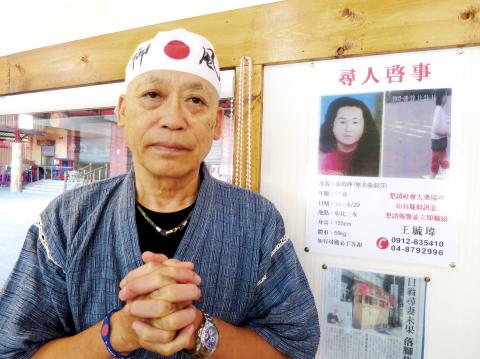After months of searching for his Taiwanese wife, who went missing in her hometown in Changhua County three years ago, a Japanese chef has opened a ramen restaurant in Nantou County in the hopes of finding his devoutly Buddhist wife in the heartland county bristling with temples.
Tamiomi Miharaya, husband of Chang Chun-ping (張鈞萍), said the couple’s dining bar in Japan was destroyed in the 2011 Tohoku earthquake and tsunami disaster, after which Chang suffered from severe depression.
Chang went back to her hometown in Changhua County to recuperate, but reportedly disappeared during a stroll at a park in Ershui Township (二水) in Changhua, he said.

Photo: Liu Pin-chuan, Taipei Times
Miharaya came to Taiwan to search for his wife.
Wearing a white frock and a bamboo hat — and hanging Chang’s picture on his neck — he walked 50km every day for two-and-a-half months throughout the county without finding any trace of her, he said.
“It is my life’s duty to find my wife,” he said.
The 70-year-old said that he is very grateful for help from the local police and fire departments, although there has not been any news of her since she went missing.
He wanted to offer a NT$1 million (US$32,025) reward for help in finding Chang, but he does not that much money to offer, he said, adding that he would nonetheless pay installments to anyone who could help him find her.
To settle in Taiwan and earn his living, he opened a ramen restaurant in Chichi Township (集集), a popular tourist destination in Nantou, where a multitude of temples are located, he said.
To maximize his search efforts, he puts up missing-persons posters in his restaurant and attaches stickers that carry Chang’s photograph on products, he said.
He said he has prepared for the worst, but would keep looking for Chang even if there is only the slightest of chances.
He plans to personally deliver ramen to the police station at Ershui on June 29 to mark the third anniversary of Chang’s disappearance and express his gratitude to officers and firefighters who have helped him in his search, he said.
He said he is at a loss about applying for permanent residency, because the government stipulates that foreign nationals must file their applications in the company of their Taiwanese spouses, which is impossible for him.
He said he had prayed for their reunion in a bow to a mascot frog at a church made of paper in Nantou’s Puli Township (埔里) and sought assistance from New Homeland Foundation director Liao Chia-chan (廖嘉展).
The paper church was built after the Great Hanshin earthquake in Kobe, Japan, in 1995 and relocated in 2008 to Puli, which suffered major damage during the 921 Earthquake in 1999.
Deeply touched by Miharaya’s story, Liao asked law enforcement officials for help and posted Miharaya’s story on Facebook, he said.

A preclearance service to facilitate entry for people traveling to select airports in Japan would be available from Thursday next week to Feb. 25 at Taiwan Taoyuan International Airport, Taoyuan International Airport Corp (TIAC) said on Tuesday. The service was first made available to Taiwanese travelers throughout the winter vacation of 2024 and during the Lunar New Year holiday. In addition to flights to the Japanese cities of Hakodate, Asahikawa, Akita, Sendai, Niigata, Okayama, Takamatsu, Kumamoto and Kagoshima, the service would be available to travelers to Kobe and Oita. The service can be accessed by passengers of 15 flight routes operated by

MORE FALL: An investigation into one of Xi’s key cronies, part of a broader ‘anti-corruption’ drive, indicates that he might have a deep distrust in the military, an expert said China’s latest military purge underscores systemic risks in its shift from collective leadership to sole rule under Chinese President Xi Jinping (習近平), and could disrupt its chain of command and military capabilities, a national security official said yesterday. If decisionmaking within the Chinese Communist Party has become “irrational” under one-man rule, the Taiwan Strait and the regional situation must be approached with extreme caution, given unforeseen risks, they added. The anonymous official made the remarks as China’s Central Military Commission Vice Chairman Zhang Youxia (張又俠) and Joint Staff Department Chief of Staff Liu Zhenli (劉振立) were reportedly being investigated for suspected “serious

Taiwanese and US defense groups are collaborating to introduce deployable, semi-autonomous manufacturing systems for drones and components in a boost to the nation’s supply chain resilience. Taiwan’s G-Tech Optroelectronics Corp subsidiary GTOC and the US’ Aerkomm Inc on Friday announced an agreement with fellow US-based Firestorm Lab to adopt the latter’s xCell, a technology featuring 3D printers fitted in 6.1m container units. The systems enable aerial platforms and parts to be produced in high volumes from dispersed nodes capable of rapid redeployment, to minimize the risk of enemy strikes and to meet field requirements, they said. Firestorm chief technology officer Ian Muceus said

Alain Robert, known as the "French Spider-Man," praised Alex Honnold as exceptionally well-prepared after the US climber completed a free solo ascent of Taipei 101 yesterday. Robert said Honnold's ascent of the 508m-tall skyscraper in just more than one-and-a-half hours without using safety ropes or equipment was a remarkable achievement. "This is my life," he said in an interview conducted in French, adding that he liked the feeling of being "on the edge of danger." The 63-year-old Frenchman climbed Taipei 101 using ropes in December 2004, taking about four hours to reach the top. On a one-to-10 scale of difficulty, Robert said Taipei 101